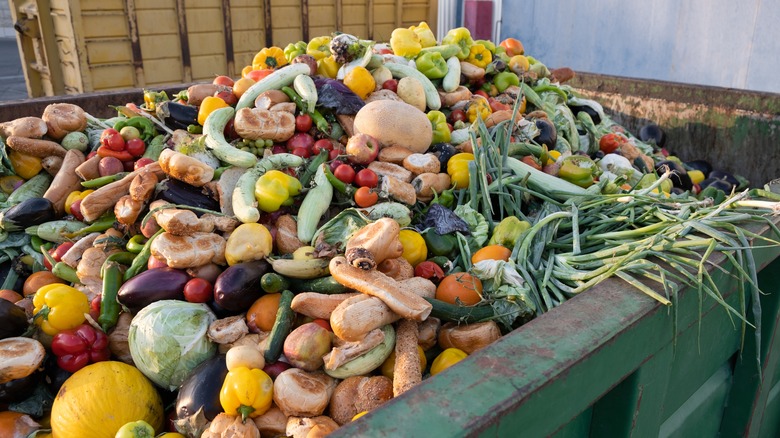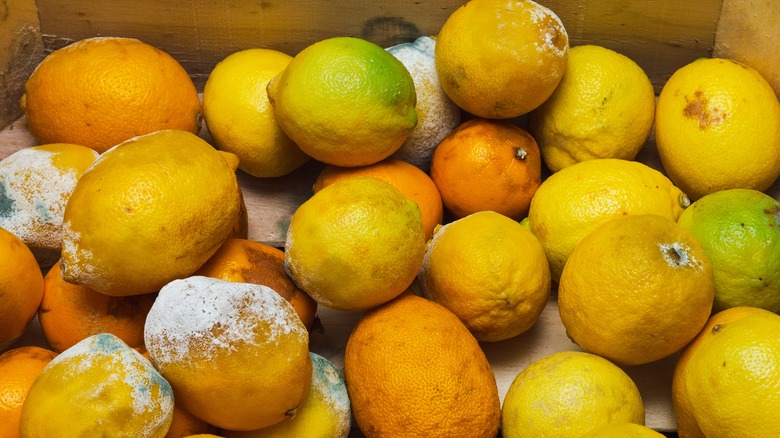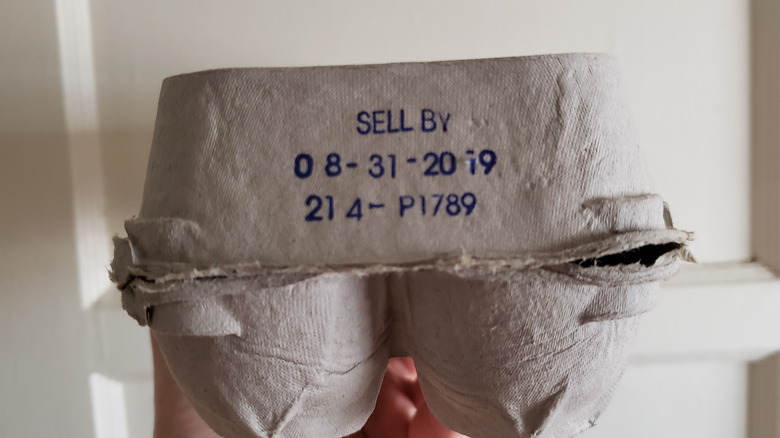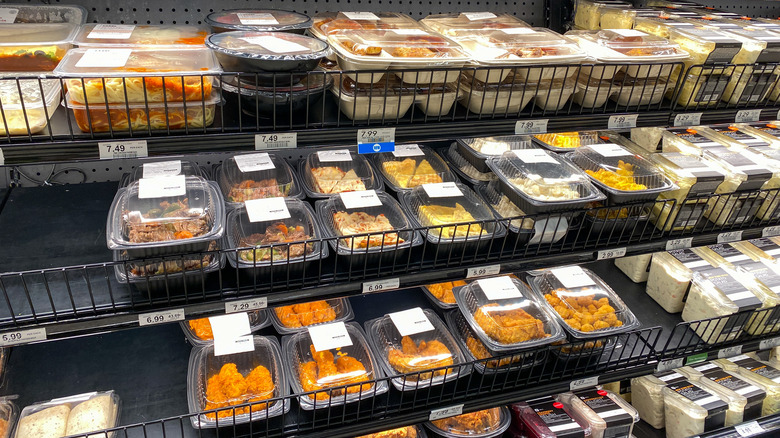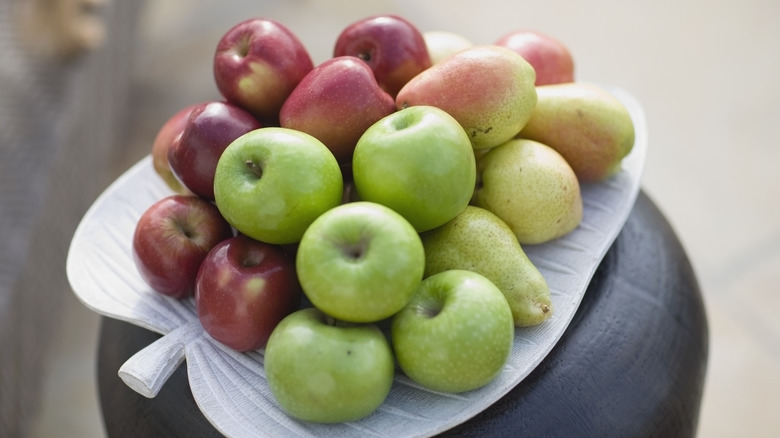What Do Grocery Stores Do With Expired Food?
Grocery stores carry a lot of food. If you don't believe us, consider taking a mental inventory the next time you're puttering around Whole Foods while shopping for groceries. Frankly, when you consider it, the sheer depth and variety of food found within that or any other supermarket is apt to blow your mind. Of course, if you simultaneously find yourself wondering how any store could conceivably sell all that food before it expires, well ... it turns out that grocery stores can't figure it out, either.
Since grocery stores tend to overstock items (particularly produce) to accommodate and appeal to 21st-century consumers (many of whom are accustomed to having any food item available at all times), it's not exactly a mystery how or why a store may find itself with a surplus of expired food. Yet the question of what happens to that expired food once it's no longer viable for sale at a grocery store remains — and is a bit more complicated to unravel.
Given the devastating amount of food waste that piles up each year in the U.S., you may presume grocery stores simply chuck expired food into the dumpster. But that's only a small piece of the puzzle. In fact, there are numerous avenues available to grocery stores when it comes to discarding expired foods. We decided to gather a list of the most common outcomes, and without further ado, provide you with answers to the question: what do grocery stores do with expired food?
Some grocery stores sell expired food to reclamation centers
Have you ever been to a discount store of some sort and noticed some technically expired items sitting on the shelf? That's not an accident. That's in part because several foods remain edible even after the expiration date has passed. Meanwhile, a large number of shelf-stable foods such as canned goods or pasta remain both safe and tasty far beyond what's dictated by the expiry date printed on the label. Consequently, grocery stores often sell those longer-lasting, seemingly-expired foods to reclamation centers, where it's then shipped to other, smaller stores to be resold.
The exact process a grocery store uses to sell expired foods to a reclamation or salvage center can vary, though some companies have a standard set of procedures for dividing and selling expired foods in this manner. Of course, while the how may not be consistent, the reason why a grocery store chooses to sell still-edible (though expired) foods elsewhere is simple: any profit is better than nothing at all.
In that sense, while perishable items such as produce are often earmarked for charitable donation, foods that are unlikely to spoil rapidly may end up going this route instead. And if business owners can recoup some of the money they spend upfront on now-expired foods, well ... who can blame them?
Donations to food banks and other charities are common
Somehow, in 2021, there were still 33.8 million people living in food-insecure homes in the U.S. While the nature of capitalism means that less-fortunate and underfed individuals may always be present in this nation, many are unwilling to turn a blind eye towards those in need. That's a belief shared by many grocery stores. When a grocery store finds itself overrun with expired (or soon-to-be expired) foods that remain safe to eat, that business may end up donating a big chunk of it to different food banks and charities.
We can't imagine this is a shocking revelation by any means. After all, expired food products (or items with similar printed-on dates, such as best-by, or use-by dates) that are deemed unfit for sale aren't necessarily unsafe to eat. Depending on the food in question, there may be little-to-no discernable difference in quality, even if the food is several weeks or more beyond the supposed expiration date.
Additionally, since expired food generally represents a sunk cost for businesses, donating expired (but still edible) food may generate public goodwill for a company. That may not be the main driving force behind a grocery chain's food donations, especially given that stores can enjoy a tax break for such donations. At the same time, one can't help but think that Walmart's donation of 696 million pounds of food to U.S. charities in 2022 was as much about appearances as it was empathy.
Much of it unfortunately ends up in the trash
"There are starving people in [fill-in-the-blank country]" wasn't just your mother's favorite guilt-laden cliché designed to keep you from wasting food. It's also an unfortunate fact of life. Of course, while reducing food waste would likely do a lot to help lower the number of malnourished and food-insecure individuals living in the U.S., actually accomplishing that task is exceptionally difficult — particularly on a corporate level. While grocery stores may throw away less expired food than you first imagined, the sad truth is that some of it is still destined for the trash.
It's unclear just how much expired food is thrown away by grocery stores on average, especially compared to food that's donated or sold. More than one-third of all available food may go uneaten in the U.S., according to food waste-focused nonprofit ReFED (via AP News). It's safe to assume that a solid portion of those expired foods ends up rotting in a landfill — as opposed to traveling through a person's digestive tract.
Thankfully, many grocery stores, including big-name places such as Walmart, have made concerted public efforts to eliminate as much food waste as possible. Since we can't change the past, it's good to know that some grocery stores are at least attempting to improve the future.
It can be used as an organic energy source
While some folks prefer to go about their lives pretending that humans' worldwide oil consumption can continue unabated for time eternal, the fact that the Earth will one day run out of oil (and all other fossil fuels) is unavoidable. Thankfully, not all of humanity has been sitting by idly waiting for that to happen. Quite a few have developed pathways to alternative (and often renewable) energy sources that have been utilized in recent decades. These include organic fuels, such as those made with certain expired foods from the grocery store.
The use of expired foods as fuel appears less limited than many had initially expected, as this isn't exclusively the purview of produce. Other items like damaged (and expired) canned goods or spoiled milk can also be converted into fuel through a process known as anaerobic digestion. Currently, however, the equipment needed to do the digesting into fuel is expensive and may present both a financial and policy speedbump to hopeful recyclers.
It's not clear how many grocery stores donate expired food products to be repurposed as fuel. But since some Walmart stores across the globe appear to make use of this option, as per the company's corporate sustainability page, it may just be a matter of time before other stores begin to consistently utilize this outlet for expired foods, as well.
Expired foods may be converted into animal feed
At first glance, a grocery store donating expired foods to be converted into animal feed may seem akin to cruelty (at least to a hardcore PETA believer). After all, if something's ostensibly not good enough for a person to eat, then we shouldn't foist that food on any poor, unsuspecting animals, either ... right? Well, no, not exactly. The impulse to anthropomorphize non-human animals ignores the all-too-crucial detail that what's unsafe for humans to eat is often perfectly fine for other animals. Hence, a grocery store might donate some expired food to help feed a variety of hungry non-human animals.
While it doesn't seem like a stretch to claim that multiple grocery stores make use of this option for expired foods, definitive proof can get hard to find. Walmart does admit to the practice on its corporate website. Then again, seeing how Walmart topped the Fortune 500 business rankings in 2022 (as it had the previous 10 years), it's clear that Walmart is often a leader in the retail and grocery store world.
Since the practice of garbage feeding is relatively common among pig farmers — as in feeding pigs food that's been deemed garbage by humans — it appears likely Walmart is far from acting as an exclusive provider of expired food as animal feed.
Some stores still sell technically expired products
Most readers are well aware that companies often use different terminology in place of expiration dates to dictate when a product should be used. Whether these are meant to deceive consumers into falsely believing an item is no longer good to eat, we can't say. But since grocery stores are aware of these labeling tricks, some choose to continue selling certain "expired" products beyond that date.
Perhaps you presumed this sort of practice would be illegal, but in many states, it's perfectly fine for a store to sell foods that may or may not be expired, so long as it doesn't attempt to hide the date printed on a package. A store selling a four-pack of Oikos Greek yogurt three weeks after the printed-on expiration date (or a use-by date, or any other printed suggestion) may not even remotely be breaking the law in some states, such as in North Carolina.
Grocery stores are unlikely to continue selling a majority of expired (or seemingly expired) foods. But the fact it's often allowed by law means a grocery store can continue selling those foods if it so chooses, so keep your eyes peeled if that bothers you.
Expired produce may be cooked into premade meals
The rise of delivery apps like DoorDash may point to the relatively slothful nature of modern human beings who don't want to make every meal. Certainly, the pre-made meals available at grocery stores can fit this theme, as well. But those meals aren't all bad, as they often feature expired ingredients still good for culinary use, even if they're not out for sale on the shelves.
Grocery stores that use this method to dispose of expired foods are almost certainly hoping to reclaim lost profits. After all, if a business can sell a food product rather than throwing it away or donating it, then it can minimize the profits lost from those expired foods.
Some grocery stores have taken this approach to expired food as a way of providing nutritious, well-rounded meal options to customers, as former Trader Joe's president Doug Rauch told NPR in 2013. Those stores aren't typically giving away pre-made meals, but if it helps one person eat healthier, we can respect it.
Some expired foods are sold on Amazon to unsuspecting customers
Online marketplaces are ripe for untoward activity. Vendors looking to sell their goods to interested buyers often turn to trusted online marketplace sites like Amazon (a little company you may have heard of). Of course, while Amazon does its best to ensure all sales are completely on the level, bad-faith vendors still pop up, like those who use the site to sell expired food to unknowing customers.
To be clear, it doesn't appear Amazon was directly involved in the sale of expired foods through its website (these included several genuinely unsafe food items such as baby formula and coffee creamer). But, as of 2020, CNBC reported that the company continued to struggle with eliminating third-party vendors eager to unload egregiously-expired foods on unsuspecting customers. Amazon told CNBC it was an isolated issue, but it's not clear that Amazon has cracked down on the problem. If you're purchasing food items from a sketchy vendor on Amazon, then you ought to be prepared to potentially receive expired foods through the mail.
Some expired produce becomes fertilizer
Like so many other folks in the 21st century, we often want to do the right thing environmentally, yet struggle to follow through. If we truly want to take a waste-not-want-not attitude toward life, perhaps we should follow the lead of certain grocery stores — at least regarding expired foods. That's because some expired produce from grocery stores doesn't end up in the trash at all. Instead, it hits the compost heap as the next step to becoming fertilizer for growing yet more produce.
Why is it that such gross, rank products like rotting fruits and veggies tend to make the best fertilizer? That's because food scraps are still full of plenty of nutrients that just need to be broken down. Between rotting produce and animal manure, it's clear some of the best things for sprouting plant life are often the worst smelling and looking items in existence.
When it comes to what grocery stores do with expired foods, it's tough to top this path. We know for sure that Walmart disposes of some expired food products in this manner, as well as other grocery stores such as Whole Foods and H-E-B.
Some apps allow people to buy overstocked and expired food at a discount
The U.S. Department of Agriculture (USDA) estimates that nearly a third of food waste happens at the retail level, often the result of overstock. Fortunately, technology has come to the rescue, hooking up places that have overstock and soon-to-be expired foodstuff with customers who want to buy the food at a discount. While some apps connect consumers specifically with restaurants getting rid of their end-of-the-day leftovers, apps like Flashfood and Too Good To Go also help to relieve waste at the grocery store. Participating locations are somewhat limited so be sure to check for availability in your area.
In some cases, consumers don't know what kinds of foods they'll get. Participants may get surprise bags that cost about $6 or less. These bags contain the overstock for the day, usually from local restaurants. The Flashfood app, on the other hand, reveals what a grocery store has to offer. The consumer pays for items on the app and then picks them up at the store later. Most excitingly, aside from reducing the amount of food that goes into the landfills each year, consumers get some really incredible deals at the grocery store –- up to 70% or more in some cases -– all because they're willing to download an app that connects them with still-edible food that would have ended up in the trash bin instead of on the dinner table.
Some fruit overstock gets turned into vegan leather
Here's a story about fruit leather, and no, we're not talking about the kind your mom used to pack in your school lunches every day. Nowadays, some leftover fruits like apples and mangoes are getting a second life as tomorrow's high-fashion offerings. A company called Allégorie works with grocery stores and farms to turn the proverbial forbidden fruit into beautiful and sustainable vegan leather products. A number of companies are creating vegan leather products using materials like mushrooms or cactus plants. In Allégorie's case, there is a line of handbags, backpacks and wallets just waiting to be produced from grocery store overstock (and other things).
Figuring out just how to turn an abundance of fruity waste into tomorrow's accessories took quite some time, and in the process, Allégorie tried a number of different types of plant foods, like mushrooms and bananas, before settling on apple peels and mangoes. Fans of the products claim that the scent of the fruits still lingers on the finished bags, making these fashion accessories delish and sustainable in more ways than one. Grocery store waste never looked so good!



